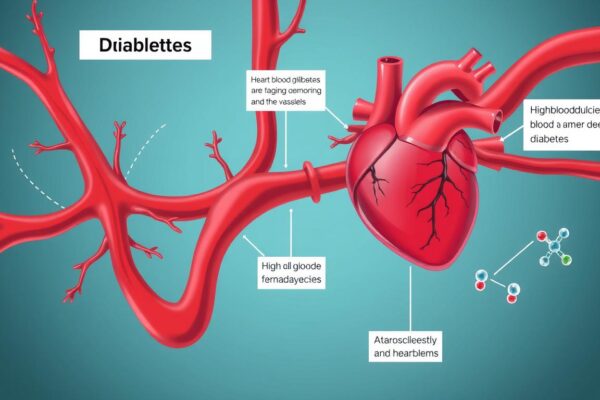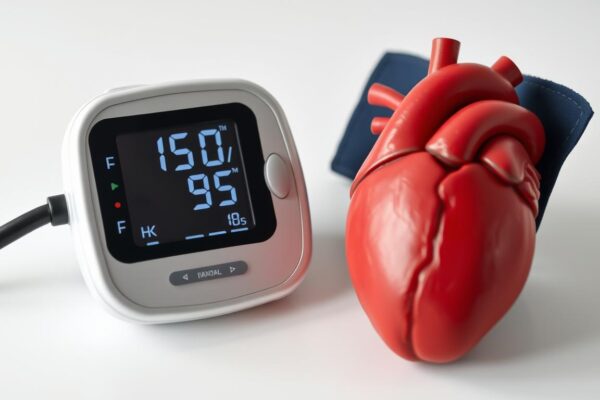Recent research has revealed that people with depression have a higher risk of developing heart disease, while those who experience heart attacks are more likely to develop depression afterward. This article explores the intricate relationship between these conditions and provides practical strategies for managing them simultaneously.
The Bidirectional Relationship: How Depression and Heart Health Affect Each Other
The complex interplay between depression and cardiovascular health creates a cycle that can worsen both conditions.
The relationship between depression and heart attacks works in both directions, creating what medical professionals call a bidirectional relationship. This means each condition can influence and exacerbate the other.
Depression Following Heart Attacks
Approximately 20% of people who have a heart attack develop depression shortly afterward. This is not simply a reaction to a frightening event – though that certainly plays a role. The physiological changes that occur during and after a heart attack can trigger chemical imbalances in the brain that contribute to depression.
A heart attack can significantly impact various aspects of a person’s life, including:
- Mood and overall attitude
- Confidence about the future
- Ability to fulfill personal and professional roles
- Physical capabilities and independence
- Self-perception and identity
Depression as a Risk Factor for Heart Disease
Conversely, people with depression but no previously detected heart disease develop cardiovascular problems at a higher rate than the general population. Studies from 2019-2023 indicate that individuals with depression have a 35% increased risk of experiencing a major cardiovascular event like a heart attack or stroke.
This increased risk exists even when controlling for other traditional risk factors such as smoking, high blood pressure, and high cholesterol.
Concerned About Your Heart Health and Mental Wellbeing?
If you’re experiencing symptoms of depression or have concerns about your heart health, speaking with a healthcare provider is an important step toward proper assessment and treatment.
3 Key Mechanisms Connecting Depression and Heart Attacks
Several biological and behavioral mechanisms explain the connection between depression and heart attacks. Understanding these pathways can help in developing more effective prevention and treatment strategies.
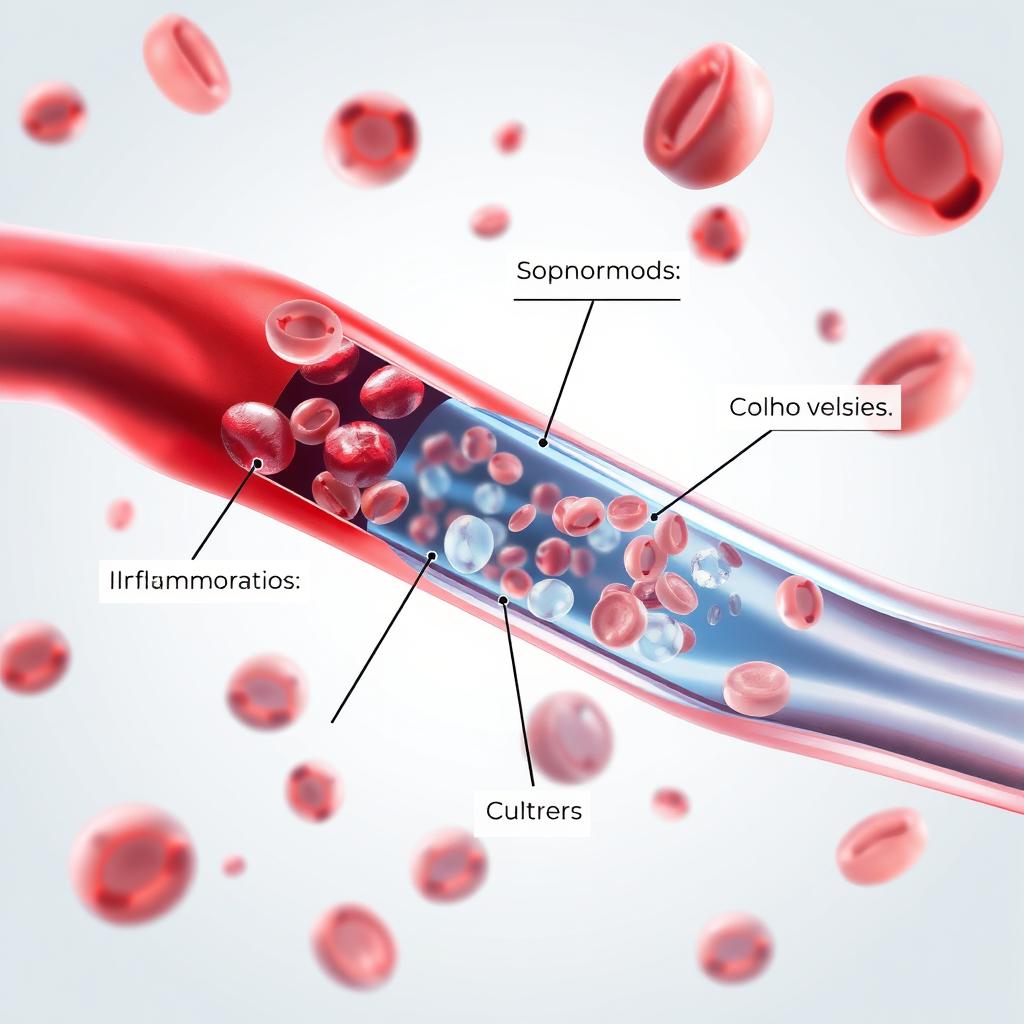
1. Inflammation and Immune System Dysfunction
Depression is associated with increased levels of inflammatory markers in the blood, including C-reactive protein (CRP), interleukin-6 (IL-6), and tumor necrosis factor-alpha (TNF-α). These same inflammatory markers play a significant role in the development and progression of atherosclerosis – the buildup of plaque in the arteries that can lead to heart attacks.
A 2022 study published in JAMA Psychiatry found that people with depression had 30% higher levels of inflammatory markers compared to those without depression, creating a physiological environment that promotes cardiovascular disease.

2. Autonomic Nervous System Dysfunction
Depression can disrupt the balance of the autonomic nervous system, which controls involuntary bodily functions like heart rate and blood pressure. This disruption typically manifests as increased sympathetic (“fight or flight”) activity and decreased parasympathetic (“rest and digest”) activity.
The resulting imbalance can lead to increased heart rate, higher blood pressure, and reduced heart rate variability – all factors that increase cardiovascular strain and the risk of heart attacks. Research from 2021 in the European Heart Journal demonstrated that this autonomic imbalance persisted even when depressive symptoms improved, suggesting long-term cardiovascular effects.
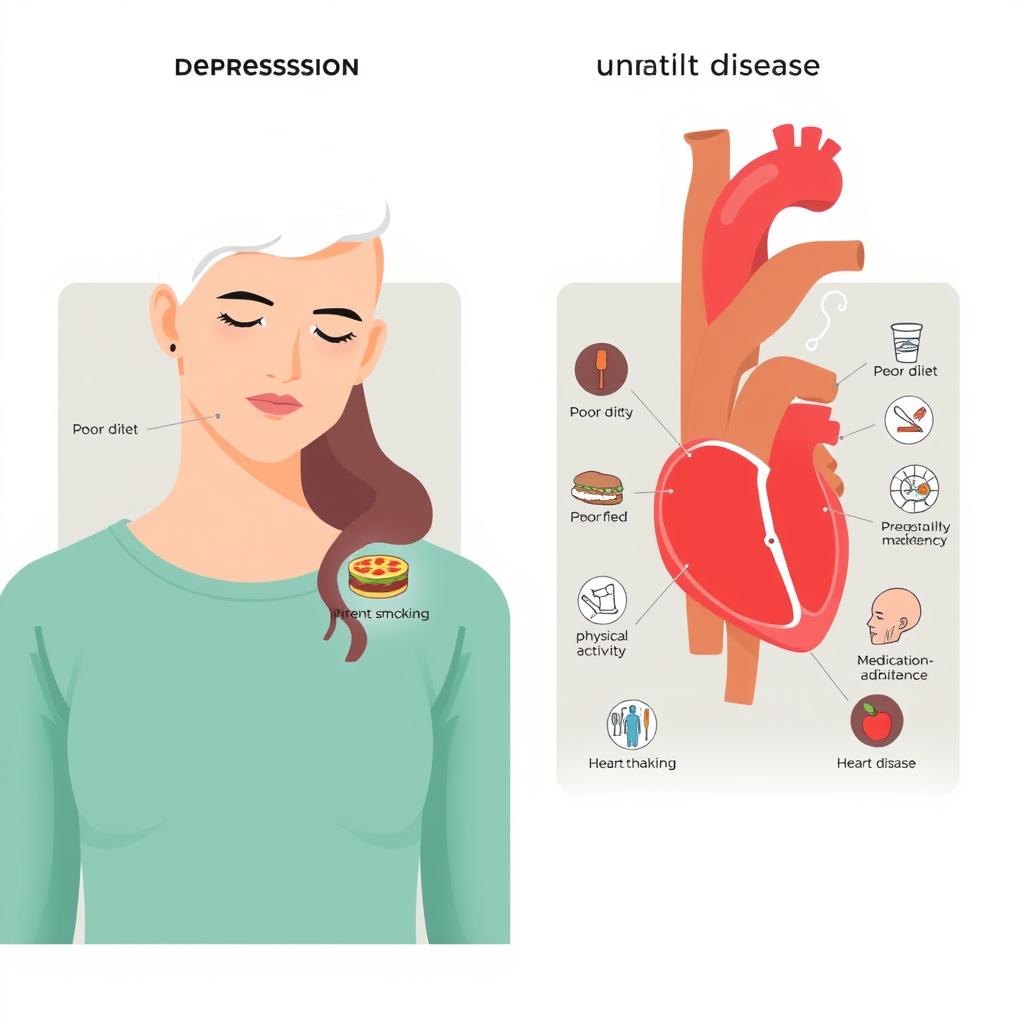
3. Behavioral and Lifestyle Factors
Depression often leads to behavioral changes that independently increase heart attack risk. These include:
- Reduced physical activity and exercise
- Poor dietary choices and nutrition
- Increased smoking and alcohol consumption
- Medication non-adherence
- Disrupted sleep patterns
A large-scale study from 2023 found that individuals with depression were 60% less likely to adhere to heart medications and 40% less likely to follow recommended lifestyle modifications after a cardiac event, significantly increasing their risk of recurrent heart attacks.
Recent Statistics: Depression and Heart Attack Risk

Recent studies show significant increased risk of cardiovascular events in patients with depression.
| Study Year | Key Finding | Population Studied | Increased Risk |
| 2019 | Depression accelerates development of cardiovascular risk factors | 71,000+ adults without previous heart events | Risk factors developed 6 months earlier |
| 2020 | Depression increases major adverse cardiac events | 25,000+ patients with coronary artery disease | 37% higher risk |
| 2021 | Untreated depression after heart attack increases mortality | 18,000+ heart attack survivors | 42% higher 5-year mortality |
| 2022 | Depression severity correlates with heart attack severity | 5,000+ patients with depression | 22-65% depending on depression severity |
| 2023 | Treating depression reduces heart attack recurrence | 12,000+ patients with both conditions | 31% reduction in recurrent events with treatment |
These statistics highlight the critical importance of addressing depression both as a preventive measure for heart disease and as part of comprehensive care following a cardiac event. The data consistently shows that the relationship is significant and that intervention can make a meaningful difference in outcomes.
Case Studies: Depression and Heart Attacks

Case Study 1: Depression Following a Heart Attack
Robert, 55, experienced a heart attack that required emergency stenting. Physically, his recovery progressed well, but within two months, he began experiencing persistent sadness, loss of interest in activities he previously enjoyed, and difficulty sleeping.
Initially, Robert and his family attributed these symptoms to the natural adjustment period following a major health event. However, when the symptoms persisted for over a month and began interfering with his cardiac rehabilitation program, his cardiologist recognized the signs of clinical depression.
After being diagnosed with depression, Robert began a comprehensive treatment approach that included:
- Cognitive behavioral therapy focused on heart-health concerns
- A carefully selected antidepressant that was safe for his cardiac condition
- A structured cardiac rehabilitation program with social components
- Family education about depression and heart disease
Six months later, Robert’s depression symptoms had significantly improved, and he was fully participating in his cardiac rehabilitation. His blood pressure and heart rate variability also showed improvement, reducing his risk of a second cardiac event.

Case Study 2: Depression Leading to Heart Disease
Maria, 42, had been managing depression for nearly a decade. While her mental health symptoms were partially controlled with medication, she struggled with consistent treatment adherence and lifestyle management.
Over the years, Maria developed several habits that increased her cardiovascular risk:
- Smoking as a coping mechanism for stress and anxiety
- Reduced physical activity due to low energy and motivation
- Poor dietary choices influenced by depressive episodes
- Inconsistent sleep patterns affecting metabolic health
Despite having no family history of heart disease, Maria began experiencing chest discomfort during physical exertion at age 42. Medical evaluation revealed significant coronary artery disease requiring intervention.
Following this diagnosis, Maria’s healthcare team implemented an integrated treatment approach addressing both her depression and heart health simultaneously. This included:
- Optimization of her depression treatment
- Smoking cessation program with psychological support
- Cardiac rehabilitation with mental health components
- Regular monitoring of both cardiovascular and depression metrics
This integrated approach led to improvements in both conditions, highlighting the importance of addressing mental and cardiovascular health as interconnected aspects of overall wellbeing.
Managing Depression and Heart Health Simultaneously
Effectively addressing both depression and heart health requires a comprehensive approach that recognizes the interconnected nature of these conditions. The following strategies can help manage both conditions simultaneously.
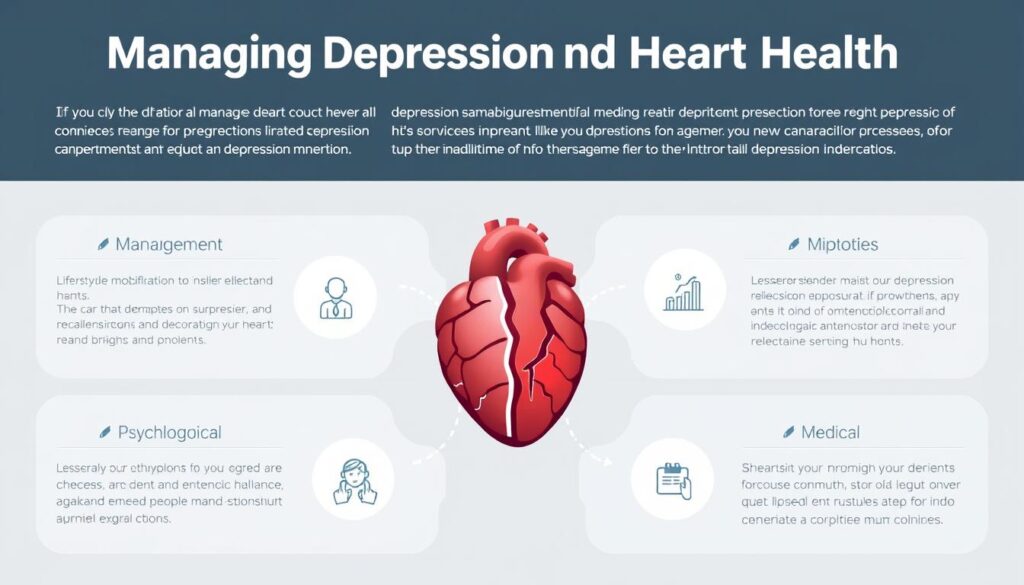
An integrated approach addressing both mental and cardiovascular health leads to better outcomes for both conditions.
Medical Management
Depression Treatment Considerations
When treating depression in patients with heart disease, medication selection requires careful consideration:
- Selective serotonin reuptake inhibitors (SSRIs) like sertraline and citalopram are generally considered safer for cardiac patients
- Certain tricyclic antidepressants should be avoided due to potential cardiac side effects
- Regular monitoring for medication interactions with cardiac drugs is essential
- Psychotherapy, particularly cognitive behavioral therapy, has shown effectiveness without cardiac side effects
Cardiovascular Treatment Considerations
Heart disease treatment should account for the presence of depression:
- Cardiac rehabilitation programs with integrated psychological components show better outcomes
- Medication adherence strategies are particularly important for depressed patients
- More frequent monitoring may be necessary due to increased risk
- Beta-blockers should be selected carefully, as some may worsen depressive symptoms
Lifestyle Management
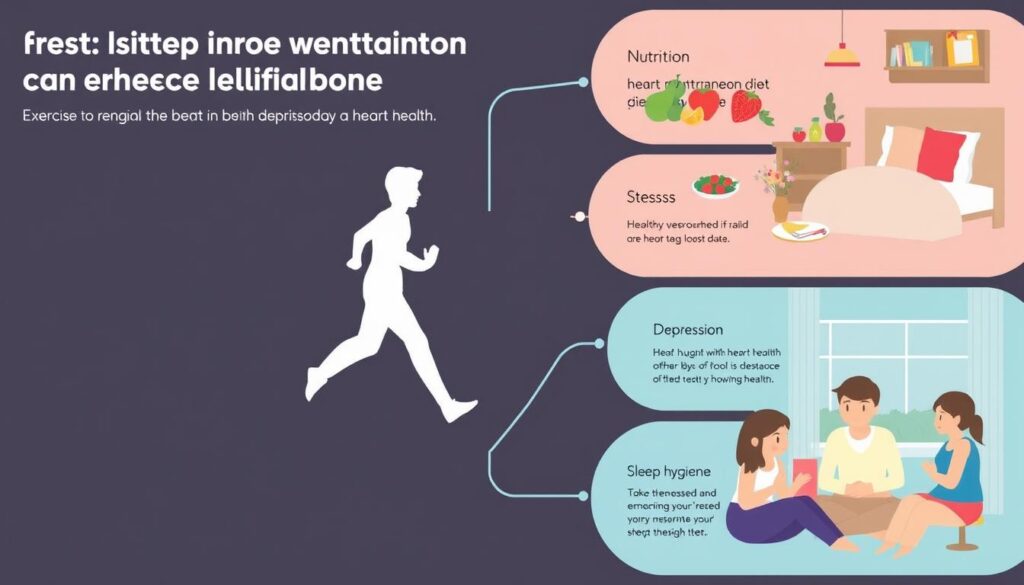
Certain lifestyle modifications can positively impact both depression and cardiovascular health.
Physical Activity
Regular exercise benefits both conditions by:
- Reducing inflammatory markers associated with both depression and heart disease
- Improving mood through endorphin release
- Enhancing cardiovascular fitness and reducing cardiac risk factors
- Improving sleep quality, which benefits both conditions
Start with 5-10 minutes of activity daily and gradually increase to 30 minutes most days of the week, as medically appropriate.
Nutrition
Dietary choices impact both mental and heart health:
- Mediterranean diet patterns show benefits for both depression and heart health
- Omega-3 fatty acids (found in fish, flaxseeds) may reduce depression and inflammation
- Reducing processed foods and added sugars benefits both conditions
- Consistent meal timing helps regulate mood and metabolism
Focus on whole foods, colorful vegetables and fruits, lean proteins, and healthy fats while limiting processed foods.
Stress Management
Effective stress reduction techniques include:
- Mindfulness meditation and deep breathing exercises
- Progressive muscle relaxation
- Guided imagery focused on healing
- Journaling about emotions and experiences
- Time in nature and gentle movement practices like tai chi
Even 5-10 minutes of daily practice can have meaningful benefits for both conditions over time.
Need Support for Depression or Heart Health?
Finding the right resources can make a significant difference in managing both depression and heart health. Connect with support groups, mental health professionals, and cardiac rehabilitation programs in your area.
Social Support and Self-Care

Strong social connections play a vital role in recovery from both depression and heart events.
Social connection and support are crucial for managing both depression and heart disease:
- Participation in cardiac rehabilitation groups provides both exercise guidance and peer support
- Depression support groups can help normalize experiences and reduce isolation
- Family education about both conditions improves home support
- Maintaining social activities and connections reduces depression risk and improves heart health outcomes
- Volunteer work or helping others can provide purpose and meaning during recovery
Monitoring and Follow-Up
Regular monitoring of both conditions is essential:
- Schedule regular check-ups with both mental health and cardiac care providers
- Track mood symptoms using validated scales or apps
- Monitor cardiac symptoms and risk factors (blood pressure, cholesterol, etc.)
- Maintain open communication between all healthcare providers involved in care
- Adjust treatment plans as needed based on progress or changes in either condition
Regular monitoring of both mental health and cardiovascular metrics helps track progress and identify concerns early.
Key Takeaways: Depression and Heart Attacks
Essential Points to Remember
- Bidirectional Relationship: Depression can increase heart attack risk, and heart attacks can trigger depression
- Significant Risk: Depression increases cardiovascular event risk by 35-40% according to recent studies
- Multiple Mechanisms: Inflammation, autonomic nervous system dysfunction, and lifestyle factors connect these conditions
- Integrated Approach: The most effective treatment addresses both conditions simultaneously
- Early Intervention: Recognizing and treating depression can significantly improve heart health outcomes
- Lifestyle Impact: Physical activity, nutrition, stress management, and social connection benefit both conditions
- Professional Help: Seeking support from healthcare providers specialized in both areas leads to better outcomes
Understanding the complex relationship between depression and heart attacks is crucial for effective prevention and treatment. By addressing both conditions with an integrated approach, individuals can significantly improve their overall health outcomes and quality of life.
If you’re experiencing symptoms of depression, particularly after a cardiac event, or if you have depression and are concerned about your heart health, speak with your healthcare provider about developing a comprehensive care plan that addresses both aspects of your health.
Take the First Step Toward Better Mental and Heart Health
Concerned about depression? A simple screening can help determine if you should speak with a healthcare provider about your symptoms.


